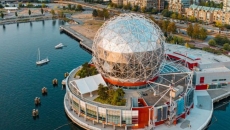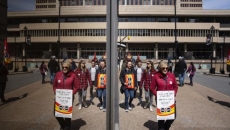Special rapporteur David Johnston says that a formal inquiry into foreign interference is not needed, but he will hold his own public hearings about the issue sometime this year.
The former governor general said an inquiry cannot be undertaken in public because of the sensitivity of the intelligence involved, and there would be considerable overlap with the work that he has already been doing to investigate the issue of alleged foreign meddling in the last two federal elections.
In order for his own public hearings to proceed, Johnston said he would not require the formal subpoena powers that a commissioner would receive if a formal inquiry was struck. The hearings could include testimony from diaspora communities, academics and political stakeholders.
"Canadians deserve forthright answers about the impact of foreign interference, and whether the government failed to act appropriately," Johnston said during a news conference following the release of his initial report.
In March, Prime Minister Justin Trudeau had asked Johnston to lead an investigation into the extent and impact of foreign interference in Canada, amid allegations that China meddled in the last two federal elections.
His first report, released Tuesday, found serious issues in how intelligence from security agencies was communicated to government.
But it did not identify any negligence by the prime minister.
"There are serious shortcomings in the way intelligence is communicated and processed from security agencies through to government, but no examples have been identified of ministers, the prime minister or their offices knowingly or negligently failing to act on intelligence, advice or recommendations," Johnston's report said.
It said there is a "lack of accountability" about who is receiving what intelligence, a situation that is not acceptable given the current threat environment.
"I did find that there are significant and unacceptable gaps in the machinery of government," he told reporters.
"Intelligence is decentralized and, in many instances, not well-communicated. It is not properly filtered to key decision-makers, and the accountability mechanisms in place are not sufficient."
Johnston's report also concluded, based on access to classified documents and security agencies, that specific accusations of interference that have dominated the political conversation were less concerning than media reports suggested.
"When viewed in full context with all of the relevant intelligence, several leaked materials that raised legitimate questions turn out to have been misconstrued in some media reports, presumably because of the lack of this context," it said, pointing to reports from Global News and the Globe and Mail that have dominated the political conversation around interference.
Johnston said that all party leaders would have access to additional classified information laying out that broader context, as long as they get the proper security clearance.
Prime Minister Justin Trudeau told reporters Tuesday afternoon that he had sent letters to his counterparts offering to help them obtain that clearance.
"I certainly hope that all party leaders will avail themselves of the opportunity to understand the facts of the situation as we continue important debates on how to best keep Canadians, businesses, our research institutions and especially our democracy safe," he said.
"I don't think Canadians would want or expect any of their leaders to choose ignorance when they can choose to have the facts laid out for them."
An inquiry digging into the allegations further would have to take place almost entirely behind closed doors, Johnston said.
"That would defeat its primary purpose, which is public accountability through transparency," the report said, adding the public process should "focus on strengthening Canada’s capacity to detect, deter and counter foreign interference in our elections and the threat such interference represents to our democracy."
Johnston told reporters: "A public review of classified intelligence simply cannot be done."
But he left the door open to determining a government-led process for declassifying information to enhance transparency, listing that as one of the questions he will be tackling in the coming months.
Opposition parties had been clamouring for an inquiry for months, but Johnston's report warned that excessive partisanship in the way the issue has been discussed is making the country more vulnerable to external threats.
"There has been too much posturing, and ignoring facts in favour of slogans, from all parties. And many of those slogans turned out to be wrong."
Conservative Leader Pierre Poilievre told reporters in Quebec on Tuesday that he thought Johnston's report was an attempt to "whitewash" serious allegations of interference — and "Conservatives are not buying it."
Poilievre said that a Conservative government would go ahead and call a public inquiry.
The Tory leader had previously described Johnston as the prime minister's "ski buddy" and refused to meet with him, describing the special rapporteur role as a "fake job."
Johnston discounted his so-called friendship with the prime minister when given the opportunity on Tuesday.
"My friendship with the current prime minister was based only on a few ski expeditions with my children," he said, noting the families had cottages near each other.
He said his impartiality or integrity has not been called into question before and said the dismissal of his work was "troubling."
"This kind of baseless set of accusations diminishes trust in democratic institutions," he said.
NDP Leader Jagmeet Singh said on Tuesday that he respects Johnston's work but disagrees "strongly" with his recommendation not to hold a public inquiry, given the "serious allegations" of interference.
He said his party is not willing to trigger an election over the issue, as it continues to prop up the minority Liberals with a confidence-and-supply deal.
Singh said he will have a conversation with Trudeau about the matter and will use all legislative tools available to push for an inquiry, though he did not say what those tools are.
Johnston himself said that when he took on the role in March, he thought he would likely recommend a public inquiry.
But he said he realized that was not the correct course of action because the intelligence he was reviewing "is, and must remain, secret."
In an interview with The Canadian Press Tuesday, International Trade and Economic Development Minister Mary Ng thanked Johnston for his work, saying it highlights the importance of informing Canadians about the risk of foreign interference.
"I think that that's the right way to go. It is making sure that there is confidence in our public institutions, and one way to do this is to start from the base of fact," Ng said.
"I would encourage the leaders of the other parties to get the security clearance offered by the prime minister and get access to that information."
Johnston said the next stage of his mandate will be to investigate the use of classified intelligence in law enforcement, the role of the National Security and Intelligence Committee of Parliamentarians and the possibility of amendments to the Canadian Security Intelligence Service Act that might improve the process of intelligence-sharing or address foreign interference.
He added that he will look at the case for a special national security committee within cabinet, and look at how government deals with threats against elected officials.
Johnston's work is expected to continue through the end of October, when he is due to present a final report to the government.






